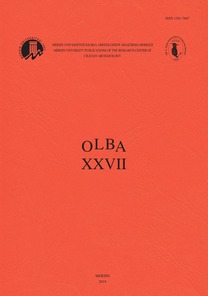Erken İmparatorluk Dönemi’nde Orta Anadolu’da
Tarımsal Stratejiler ve Roma Ordusu
Roma Dönemi’nde, çok dönemli Gordion bölgesi etrafında, palaeo-çevresel ve bağlantılı unsurların güncel analizi, yoğun ve son derece sürdürebilirlikten uzak toprak kullanımı dokusu olduğunu ortaya koymuştur; bunun olası nedeni, toprak sahiplerinin, eyalet otoriteleri tarafından kesilen ve ‘sık olan ağır vergi’ talebini karşılama ihtiyaçlarını, üretim fazlası ile tatmin etmek olabilir. Bu ‘ağır’ vergilerin yapısı çok bilinmemekle beraber, Roma Dönemi’nde yoğunlaşan Gordion’daki toprak kullanımının nedeninin, Galatia-Cappadocia birleşik eyaletinin Nero-Flavius döneminden itibaren alayların ve süvari birliklerinin yemek ve yem ihtiyacını karşılamak üzere hizmet vermesiyle açıklanabilir. Bu iddianın kaynağında, Gordion’un İ.S 1. yüzyılın ortalarından, erken 2. yüzyıla kadar askeri üs olarak kullanılması yatmaktadır. Bu coğrafyanın, bu şekilde kullanımı hemen hemen Galatia’nın eyaletleşmesinden bir tam yüzyıl sonra başladığı için, bir askeri varlığın, güvenlik nedeni ile talep edilmiş olması çok mümkün görünmemektedir. Bu durumda böyle bir etkinliğin bir şekilde, Nero-Flavius Dönemi’nde, Orta ve Doğu Anadolu’da artan askeri etkinlikle bağlantılı olarak çıktığı yönünde güçlü bir iddia oluşmaktadır.
AGRICULTURAL STRATEGIES AND THE ROMAN
MILITARY IN CENTRAL ANATOLIA DURING THE
EARLY IMPERIAL PERIOD
A recent review of the palaeoenvironmental and related evidence for the multiperiod site of Gordion has identified a pattern of intensive and ultimately unsustainable land use for the region during the Roman period, a pattern interpreted as resulting from the need for over-production by estate-owners to comply with the “often onerous taxes” levied by the provincial authorities. The nature of these “onerous taxes” is not made clear in that review, but it can be argued that the Roman period intensification of land use at Gordion initially came about from the need to supply food for the legionary and auxiliary troops stationed in Galatia and Cappadocia from the Neronian-Flavian period onwards. This explanation is suggested by the evidence that Gordion served as a Roman military base between the mid-1st and the early 2nd centuries. As the use of the location in this way began almost a full century after Galatia was provincialised, a military presence there at that time is unlikely to have been required for security reasons. In which case there is a strong probability that this activity was somehow linked with the increased military activity in Central and Eastern Anatolia that began in the Neronian-Flavian period.
